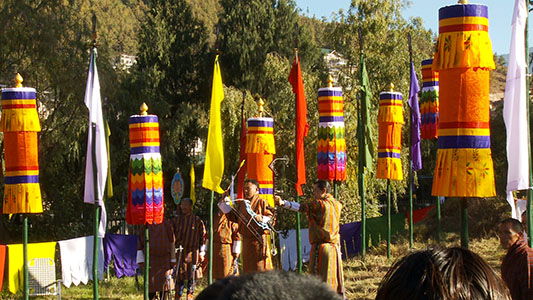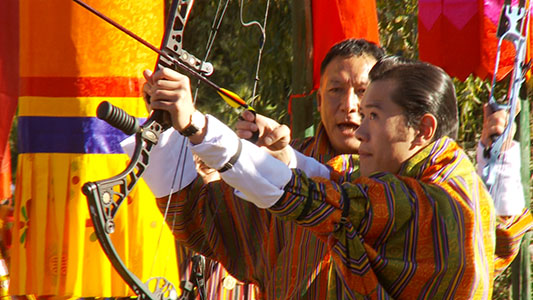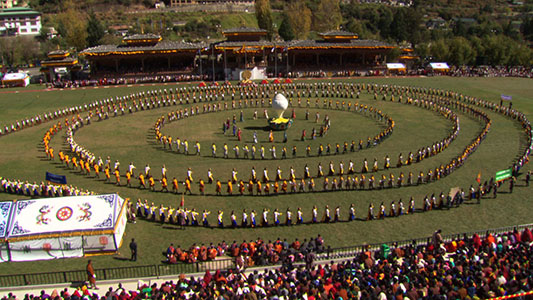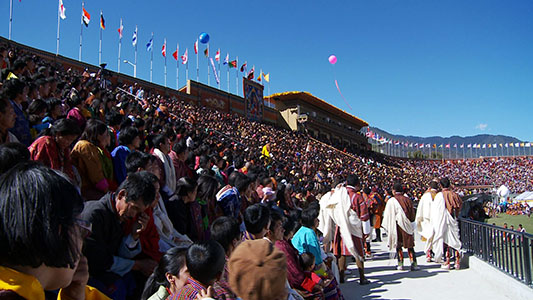Story
A tiny Buddhist country has grand ambitions. Bhutan has emerged from centuries of isolation and monarchy to embrace democracy and modernity while preserving its ancient past. There is much at stake for the country’s booming population under the age of twenty-five and for its newly crowned young King. In this complex world, can Bhutan truly be a kingdom of happiness?

Nestled in the Himalayas, Druk Yul, better known in the west as Bhutan, 5th Dragon Kingis the only country in the world that supports a policy of “Gross National Happiness.” Precariously wedged between China and India, Bhutan remained remarkably isolated for centuries, peacefully following the guidelines of Mahayana Buddhism under the benign supervision of an absolute Monarch-traditionally known as the Dragon King.
But the winds of change were blowing through the desolate high valleys of Druk Yul and after a period of rapid growth and development, their extraordinary monarch, His Majesty, the fourth King, Jigme Singye Wangchuck, did a remarkable and radical thing.
He abdicated his throne to his young son Jigme Khesar Namgyel Wangchuck and announced that from 2008, the country, population less than 1 million, would become a modern democracy.

On the very auspicious day of November 6, 2008, deemed by the sacred Astrologers, Bhutan crowned its 5th Dragon King, and our High Definition crews were given unprecedented access. Our story begins with the excitement and splendor of the Royal Coronation, the visual thread that links our characters and themes.
We enter the world of the Royal family in 2006 as they educate the people across Bhutan about becoming a democracy. Through insights from Bhutan’s government and spiritual leaders, including the opposition party, we understand Bhutan’s dedication to honoring its past, to remaining independent and to preserving Gross National Happiness in a modern society.

Our cameras take us into the lives of the Bhutanese. We capture unexpected candor from members of the Royal family, government officials, entrepreneurs, educators, farmers, Bhutanese youth- even the Royal Chef.
Through personal stories, we travel Bhutan’s lush forests and sparkling rivers. We meet practitioners of traditional medicine and the engineers who run Bhutan’s booming hydroelectric power industry. All share a commitment to protecting the country’s pristine environment while carefully growing their economy.
In every encounter, we discover what Gross National Happiness means to the citizens of Bhutan. Are they happy? How do they see their new King? How do they feel about becoming a democracy?
While Bhutan is a land of peaceful tranquility, it is not without its problems. The 21st century has arrived. Today, businessmen and women wear both customary robes and western-style clothes. Children attend school during the day instead of working on family farms. Tourism, television, cell phones and the Internet are part of the national scene. Modernity brings prosperity as well as challenges- like crime, drug abuse and alcoholism.

As the new King prepared for his coronation, the challenge ahead seemed as forbidding as the mountains that dominate every skyline. Still, with his combined Western education and deep roots in Buddhism, His Majesty, Jigme Khesar Namgyel Wangchuck is well positioned to lead Bhutan. Like his remarkably altruistic father, this twenty-eight year old monarch is a filled with love and compassion for his people and for all sentient beings.
How will the new King help his people embrace the benefits of globalization while keeping their traditions and culture intact? Is Bhutan’s concept of Gross National Happiness really a possibility for a 21st century democracy?
Bhutan: A Kingdom of Happiness takes viewers on a journey to experience history in the making. In these times of global economic turmoil and re-evaluation of our social and financial values, the film offers a vision for the future that is truly inspiring.